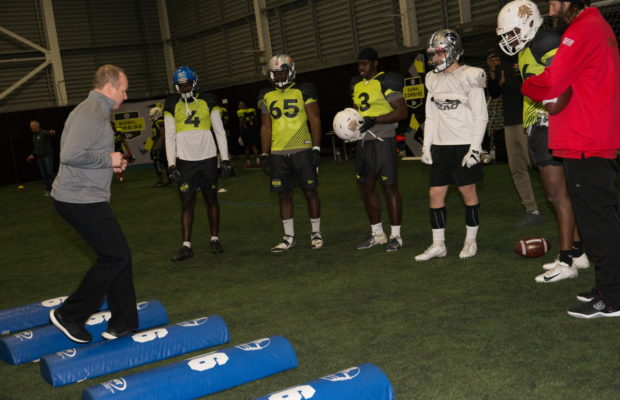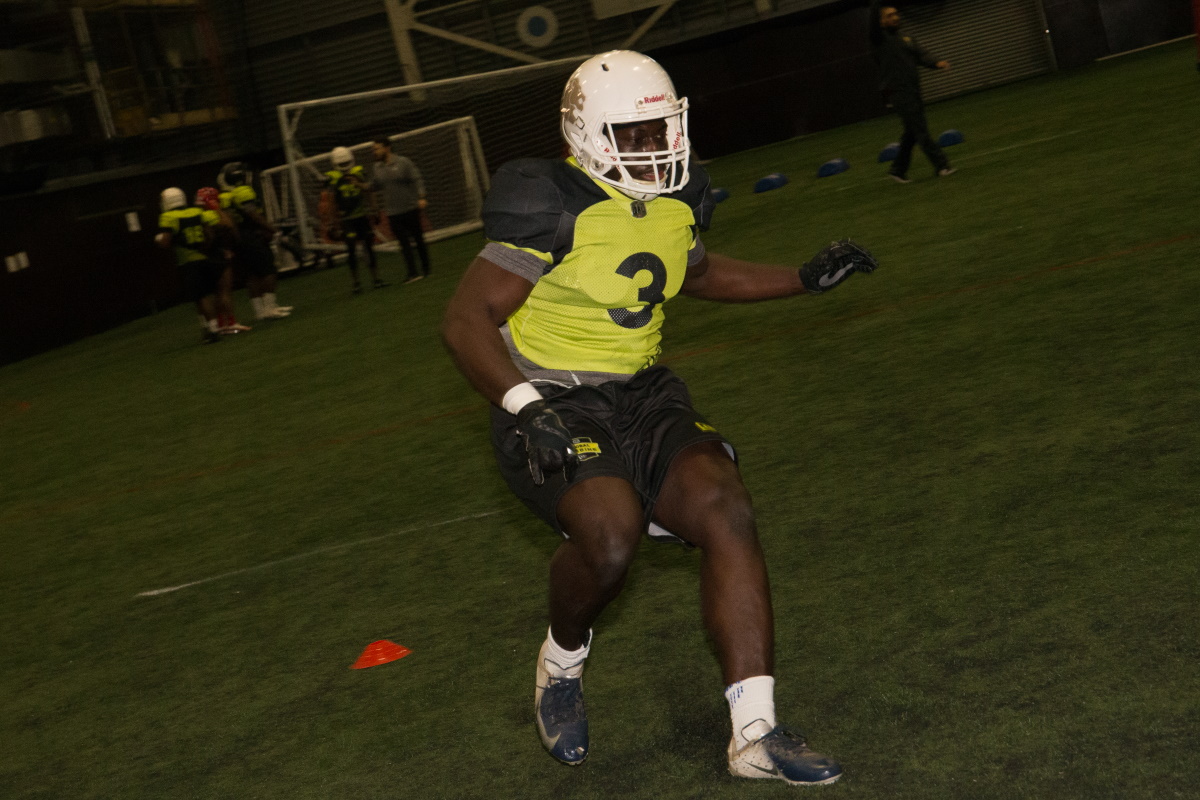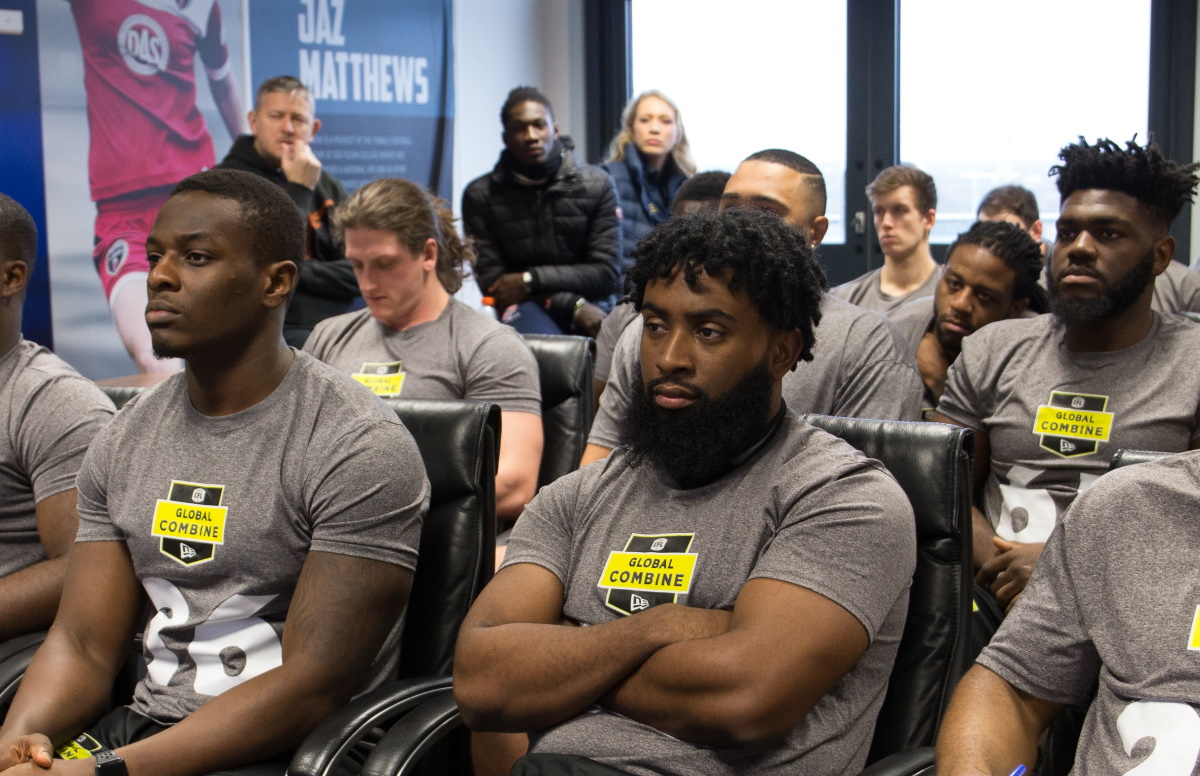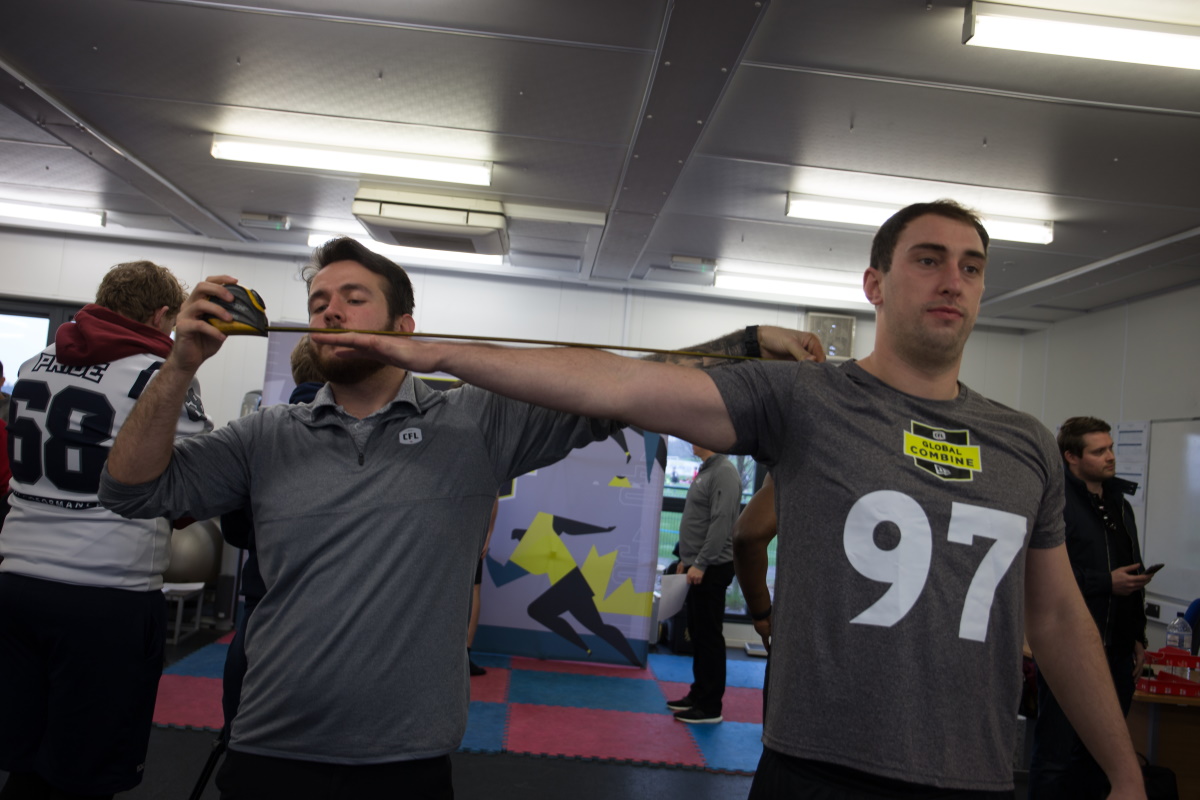A British take on the CFL Global Combine in Great Britain

The Canadian Football League has launched a global outreach program unlike any other. Throughout January, scouts and coaches from Canada crisscrossed Europe to assess some of the continent’s finest gridiron talent.
The CFL aims to establish itself as a “global league” and aims to do so by finding the best players from outside North America and bringing them to the world of three-down, 12 man football.
On the last weekend in January, the CFL crew were in Bristol to evaluate the talent of players from the UK.
“The NBA is a global league, the Premiership is a global league,” the CFL’s head of football operations, and chief financial officer, Greg Dick tells 18 young British hopefuls, and one London-based Australian wide receiver gathered in a small classroom on a Saturday morning.
Over the course of five or so hours, these athletes were measured, weighed and asked to jump, lift weights, sprint and show they can put those attributes to use on a football field to earn an invitation to do it all again in Toronto.
The 19 participants from across Britain, with many having links to London, have traveled to the sports college in Bristol, a city some two hours and 18 km (114 miles) west of the capital, for the CFL’s first-ever combine in Britain.
Selection workouts held in Europe last year saw players from Germany and France, among others, drafted into the CFL alongside players from Mexico. The CFL has agreed to partnerships with leagues and governing bodies across the world and the combine is a result of its work with the British American Football Association which runs an amateur league with some 70 clubs while there are about the same number of teams competing in Britain’s university league.
In March some 60 players will attend the Toronto combine and the CFL’s nine teams, that are required to set aside two active roster spots for “global” players and up to five places on practice rosters, will draft 45. The 19 sat fidgeting during Dick’s presentation, anxious to show their physical prowess, are told at least one of them will be in Toronto. More invitations could be issued after combines have been held in Japan and Brazil.

Jason Selormey running through drills Photo: Martin Preedy
But Dick warns those about to take part that, as well as covering any sportswear branding that isn’t that supplied by the CFL’s partner New Era, they must be committed to the prospect of moving to Canada for at least six months.
“Last year a few guys who committed to the draft bailed out. One guy bailed on the day he was supposed to fly out, it could have been various reasons. Maybe they didn’t want to quit their jobs. But W.T.F right?” asks Dick, seemingly seeking reassurance playing professional football is the number one priority for these mostly university-educated players.
Jason Selormey has already made up his mind about a move to Canada. He and girlfriend Kelly Aston, who is among a small group of family and friends who’ve come to support the trialists, have sat down to discuss visas – and the exchange rate between Canadian dollars and British pounds Sterling.
The CFL is offering modest contracts worth $54,000 Canadian to those on active rosters while practice squad players will receive a smaller amount but have their food and accommodation costs met by their team.
“It’s not as much as people think, it’s about £35,000. It’s not NFL millions but it’s decent money,” says Selormey who as a 15-year-old was inspired to try a new sport by playing John Madden video games. Though the 24-year-old warehouse worker plays for the London Blitz, consistently one of the top two sides in Britain over the past 10 years, he now lives in Weston-super-Mare, a seaside town 3 km from Bristol, with Aston.
“He would be really excited to go to Canada, he would really love it,” says 22-year-old Aston using her mobile phone to film Selormey’s 14 grueling bench press repetitions as the other trialists shout support. “He works in a warehouse and his day starts at 4.30 am and he works until about 3.30 in the afternoon and is straight to the gym. He also travels to London most weekend for training.”
The defensive back says his long days have been motivated by the opportunity presented by the CFL:
“I get up at 4.30 I have breakfast between 5 and 6 and stretch. I work from 6.30 until 3.30 and then the gym for three hours but I’ve started to work a bit harder as today was coming up. I want to be the best player I can be and if that takes me to the NFL or it takes me to the CFL then that’s OK. My life is about fulfilling my potential and playing to the best level I can.”

Early morning classroom orientation session Photo: Martin Preedy
Defensive lineman Matt Sharp has already tasted football on the other side of the Atlantic, and like at least eight of those at the combine, as a semi-professional in Europe.
The 27-year-old has played in Germany’s GFL and joined the London Blitz due to its close links with the US collegiate system. That led to playing as a tight end for two years at NCAA Division II West Chester University in Pennsylvania.
A foot injury forced 6’6 and 18 stone, but slimline, Sharp to sit out the final drills with an ice pack taped to his left foot and he is reflective about what the combine could mean for him:
“To an extent, I do feel like that is probably it for me. But you never know, I’ve said that before in my life, and you’ve got to hope. Potentially it could be it, but what a way to finish the run at a professional combine.”

Matt Sharp getting measured up Photo: Martin Preedy
Sharp, who currently combines work as maths supply teacher with IT, hadn’t studied the financial terms before attending and is simply keen to test himself.
“For me I just know the CFL is the second biggest league in the world,” but he can understand why for some, including those players who a year ago pulled out on the dream of playing professional football and its associated risks, it may not be everything. “It’s not massive money and most of these guys here have been to university, typically if you’ve been to university you get paid more. I guess it makes sense, it’s probably the reason some of them (last year) didn’t go through with it.
“With things like the CTE (brain injury) it has got to be worth it and you have to take all these things into consideration.”
All who have attended the combines, regardless of whether they are invited to Toronto, are eligible for the global draft and to be signed as a free agent. By the end of the day 18 know that they must rely on these late chances as linebacker David Izinyon, who last season played with the Rostock Griffins in the GFL, is confirmed as having secured the invitation to Toronto to congratulations and hugs from his competitors.
Sharp, who lives in Southend, near London, only started playing gridiron when he left his home for the University of Derby at 19 and joined its Braves football team. Since then he has been diagnosed as a type 1 diabetic and gone on to play in the USA, things he hopes others can take inspiration from.
“I’m a type 1 diabetic and was diagnosed before I went to America that was big shock and it did set me back. I had to keep an eye on sugar levels and inject my insulin basically what my pancreas used to do. A big part of this for me is the diabetes, it shows it is possible to achieve in sport. A lot of kids turn a blind eye to being diagnosed and pretend it has never happened but I’ve embraced it and keep proving the doctors wrong. It’s also to show big guys can be good at maths and science and sport.”
“I’m one of the few who’s managed to go to America and everyone has this huge feeling American guys are so good and there is this huge gap between Britain and America but there are guys here good enough to play in America and are just as good athletes as the Americans are.”
The CFL’s ambition of becoming a global league is based on that shared vision and league officials hope its trawl of the outer reaches of the gridiron globe provides its teams with athletes just as good as they can find in North America.